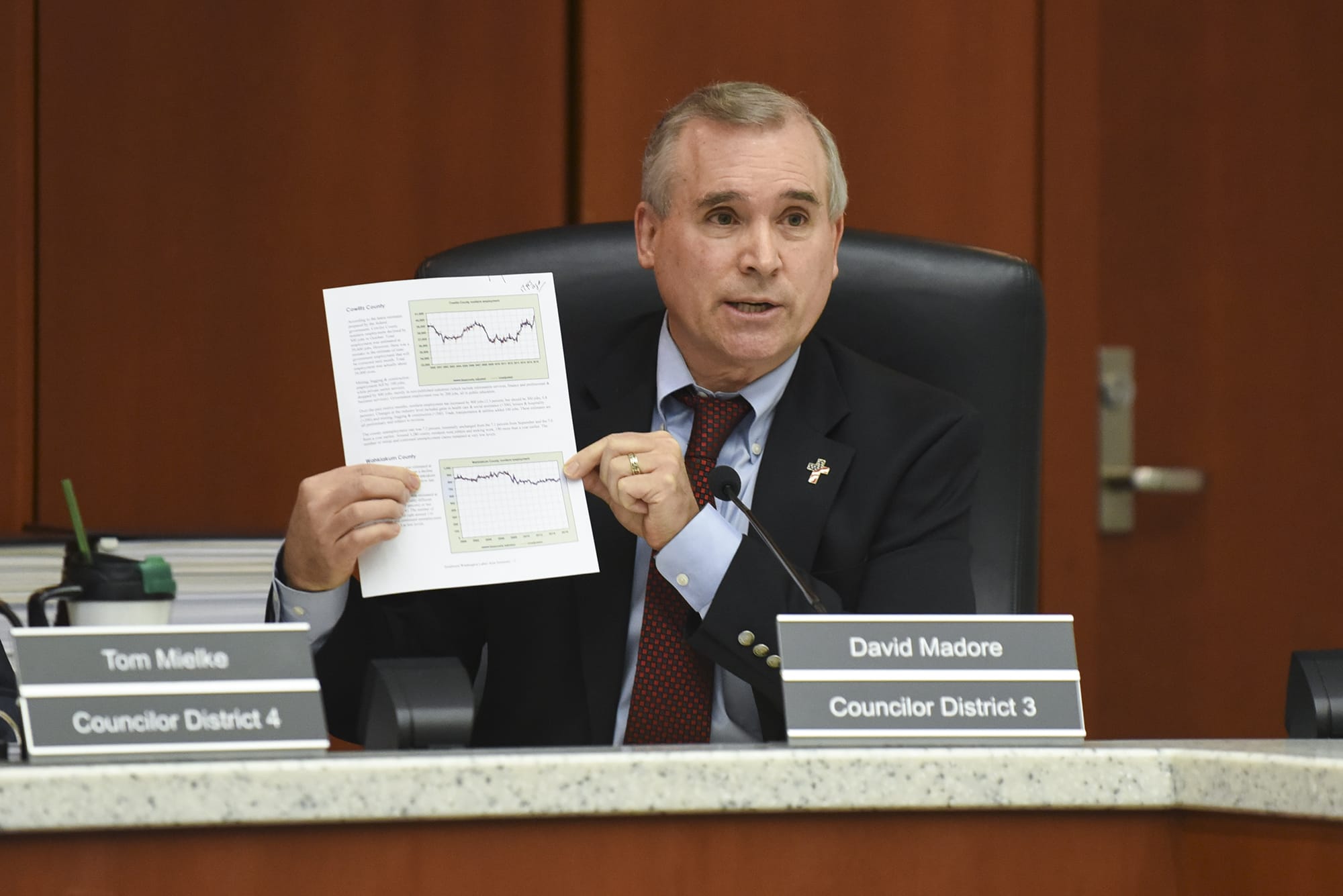The Clark County council held its final meeting with Tom Mielke and David Madore as councilors on Tuesday. During the hearing, the council undid one of the signature programs championed by the embattled duo.
On a 3-2 vote, the council voted to repeal a program that waived traffic impact and application fees for nonresidential development in unincorporated areas of Clark County. The program was created in 2013 with the support of Mielke and Madore, who will be stepping down from the council later this month, as a way of encouraging development and economic growth.
In July, the council passed a resolution signaling to developers that the program would likely be unwound or significantly altered by the end of the year. The resolution was in response to concerns that the program didn’t have a clear link to economic growth and that it deprived county government of revenue while underwriting projects that would have been built anyway.
During Tuesday’s hearing, Madore defended the program, saying that it bolstered job creation and made Clark County the “most business-friendly community on the West Coast.” He pointed to a recent report from the state Employment Security Department that found that Clark County outpaced the Portland metro area, Oregon, Washington and the nation in job growth.
The report, released in October, found that Clark County added 6,400 jobs in a one-year period, representing 4.2 percent growth. Madore also pointed to a county report showing 437 projects have qualified for fee waivers under the program, which he said are anticipated to create 3,845 new employees and generate $614 million in annual sales. Madore also claimed that the program spurred increases in tax revenue for the county.
“That’s what we hoped our business-friendly policies were going to do when we adopted this program,” Madore said. “We invite the businesses in our community to say now is the time, Clark County is the place because we’re more competitive than the other communities, especially across the river.”
Indeed, Scott Bailey, Employment Security’s regional economist who authored the report , told The Columbian that 17,300 jobs were created in the county — including incorporated and unincorporated places — since October 2013. However, he noted that county is benefiting from the national economy’s recovery from the recession and the Portland metro area’s particularly strong rebound.
But Bailey also mentioned a 2014 county audit of the fee waiver program that found that it hastened projects that would have occurred anyway and that most of the job creation occurred in low-paying occupations. The audit recommended that the program be scrapped or changed to include more accountability or performance mechanisms.
Councilor Julie Olson said during Tuesday’s hearing that there is no clear connection between the fee waiver program and new jobs and taxes.
“So it’s not just this fee waiver program that accounts for the job growth and economic development in this county,” she said. “All the cities in this county are growing; they’re growing at a faster rate than unincorporated Clark County.”
Councilor Jeanne Stewart also raised concerns about the program’s cost. According to a county report, $4.8 million in application fees and $3.7 million in traffic impact fees have been waived to date. Stewart raised concerns that the county was unfairly helping commercial developers at the expense of others.
“I’m sorry to see it’s going to be taken away, but I’m thankful that we’re back to work again,” Madore said shortly before the council voted to repeal it. He and Mielke voted against the majority.
During the same meeting, the council voted unanimously in support of an ordinance that defers impact fees for new single-family housing. The ordinance brings the county in line with a state law passed in 2015 and allows developers to defer paying impact fees for 18 months.
“I think that it’s a very good idea to allow those that are investing in our communities to not have to go and get a loan to pay the fees up front when the impacts aren’t going to happen until later,” said Madore.
Jamie Howsley, a local land-use attorney who serves as government affairs director for the Building Industry Association of Clark County, told The Columbian that the impact fees, which cover impacts on roads and schools from new development, typically run from $15,000 to $20,000 per home and it makes more sense to fold these expenses into closing costs of a home sale.
Local school districts had raised concerns about losing out on the fees. But Marnie Allen, legal counsel for all nine of the county’s school districts, told the council that local schools support the ordinance as written.




